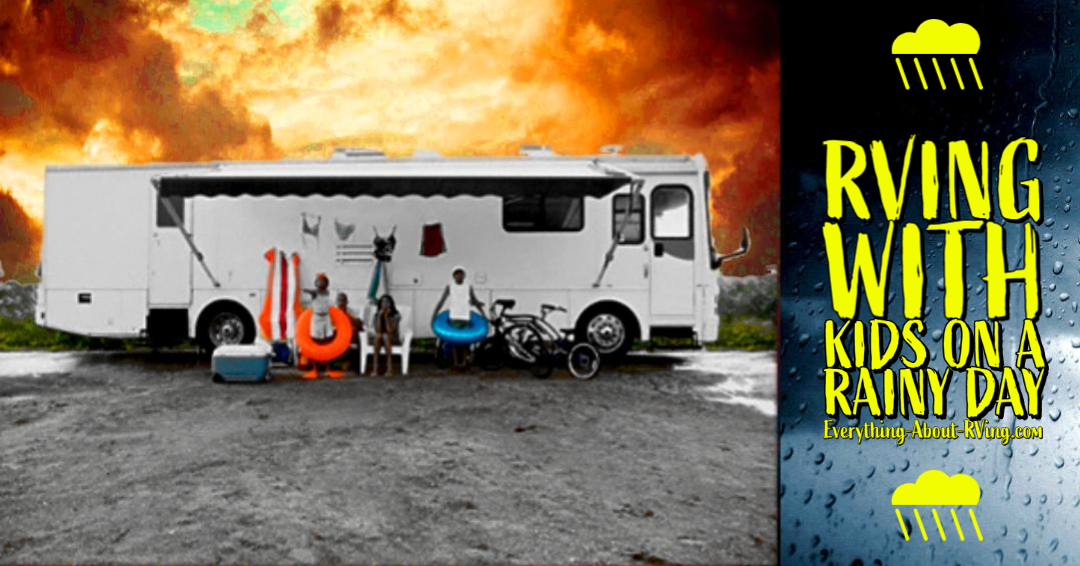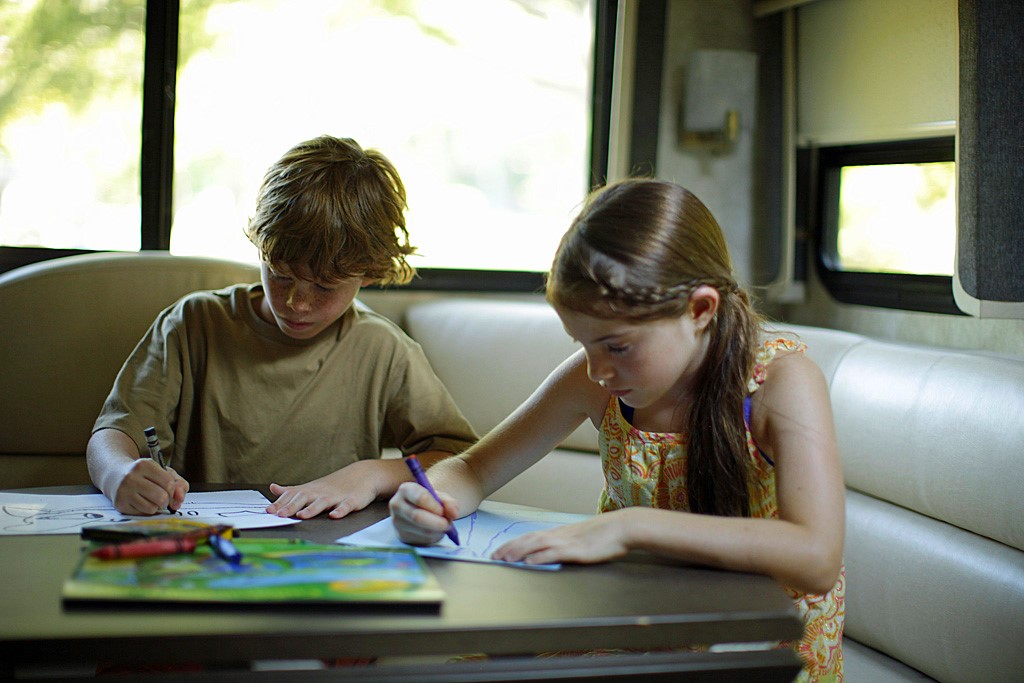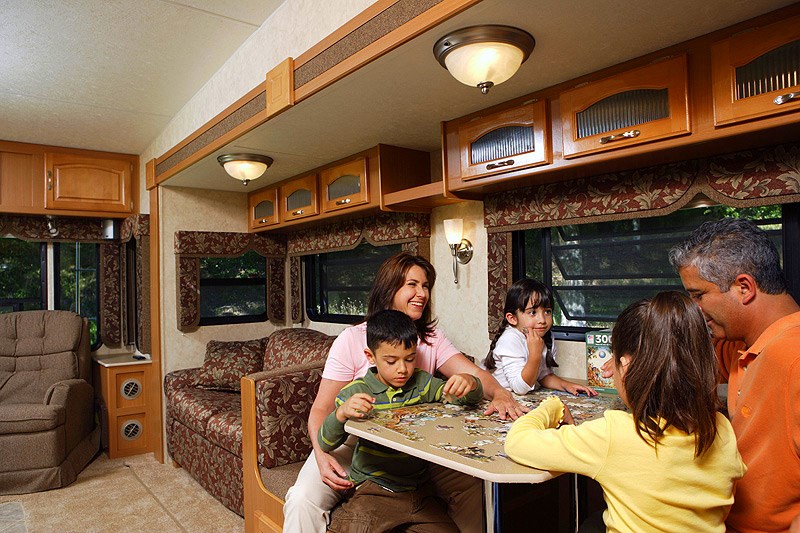RVing With Kids on a Rainy Day
Here are some great indoor games to play with your kids when it is raining at your campsite
RVing With Kids on a Rainy Day
By Luke Rees
RVing with kids is a prime setting for heightened emotions. If it rains and you’re stuck inside then the trip could go one of two ways: it could either be the best bonding experience you’ve had as a family, or it can result in the most fights, tantrums and tears you’ve ever seen in one place at the same time.
Kids are unpredictable when they’re in a new environment: all the novel stimulation means they seem to have boundless energy which must be expended in some way – most often in pranks and fights (especially with boys).
On the bad days the kids are always one step ahead of you with their pranks (never underestimate the ingenuity of children hell-bent on having ‘fun’), but on the good days you always have something for them to do, no matter what the mood or the situation.
Here’s a list of the top ten rainy-day games to keep your children occupied on the road or at the campsite.
Fortunately-Unfortunately
You can literally play this game for as long as the rain falls. One child starts with a sentence containing a fortunate events, e.g. ‘Mary went on the trampoline’. The next child then has to continue the narrative but with an unfortunate event, e.g. ‘Unfortunately, the trampoline had a hole and she fell through it’. The following person then has to say a fortunate event, e.g. ‘Fortunately, she lives on a giant marshmallow’. And so on…
20 Questions: Animal Mineral Vegetable
One child thinks of any animal, mineral or vegetable and everyone else has to guess what it is using just 20 questions. All the questions must be asked in such a way that the answer is either a ‘yes’ or a ‘no’. If the guessers manage to get the answer it becomes someone else’s turn to be the question master. If not, the child gets to go again (limit a turn to three goes).
I Went To The Shops
Another classic memory game. Someone starts the game saying, ‘I went to the shops and I bought…’ and then an item beginning with the letter ‘a’. The next person in the circle then has to repeat the line and add another item of their own, this time beginning with ‘b’.
The game continues and the list gets longer and longer (and usually more and more ridiculous). It ends when someone gets an item wrong. Variations for older children include adding an adjective before each item, e.g. an angry ant, a boring brick, a clever clipboard etc.
Who Can Count A Minute?
This game comes in handy if you need to calm everyone down, fast. Get out your watch and have the kids count 60 seconds in their heads. Then get them to shout out when they think a minute is up. The closest person to 60 seconds wins a point. You can keep playing for as long as you want silence.
Statues
If there’s no containing their energy then this game is more physical. One child covers their eyes and everyone else has to find a spot in the RV and freeze in position. After counting to ten the child must attempt to make all the statues move or laugh, but without touching. The first person to break character becomes the new counter.
Simon Says
Use this tradition game if you want both physical and mental energy is focussed on something positive. The adult begins as Simon, who calls outs the actions along with the phrase: “Simon says”, e.g. “Simon says…nod your head”. If Simon calls out an action without saying “Simon says” beforehand and any of the children perform that action, then they are disqualified. The last person left in the game becomes the next Simon.
Name, Place, Animal, Thing
A fun vocabulary game, one child starts sounding out the alphabet in their head starting with ‘a’. The next child says stop and the letter they were thinking of becomes the starting letter. Let’s say it was ‘k’. The first person to the right in the circle has to think of a name beginning with ‘k’ (e.g. Kevin); the next person must think of a place beginning with ‘k’ (e.g. Kenya); the next, an animal (e.g. Koala); and finally, a thing (parents should use their own discretion as to what constitutes ‘a thing’).
Once everyone in the circle has thought of something, the game begins again starting with the person to the right. A name, place, animal, or thing cannot be said more than once.
The Listening Game
If your children are younger then this is a much simpler game that works well with younger children. Collect several items around the caravan or tent and have the children look at these items. Next, take them away and get one child to hide his or her eyes. Pick up one of the items and make a sound with it. Get the child to guess which object made the sound.
Examples might be a saucepan (bash it), a towel (whip it gently), some sticks found in the woods (knock them together): get creative!
Consequences
The only game that provides props, and it’s just pen and paper. Everyone takes their piece of paper and a pen to write with and begins by drawing the head of an animal, human or alien. They then fold over the head and pass it round the circle. Everyone now draws from the shoulders to the stomach, including arms/wings/udders etc. Fold up the paper again and pass it around again for the legs to be drawn. One more pass around and the feet can be added. Open up all the fold to see the monstrosity that has been created!
Charades
Another traditional guessing game that can be played by all ages. The actor has to get his audience to guess a book, movie, TV programme, person, place, or thing without using language or sounds, only physical movements.
About The Author
Luke is a former cabin councillor at a summer camp in Philadelphia who now works as a travel writer and blogger on behalf of Cosford Caravans.
Do you have any suggestions or comments on this topic? You can add them to this page by using the comments section located below.
Return to the RV Lifestyle Articles page from the RVing With Kids on a Rainy Day page






